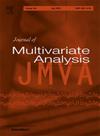使用Ledoit-Wolf收缩方法对椭圆分布的观测进行分类
IF 1.4
3区 数学
Q2 STATISTICS & PROBABILITY
引用次数: 0
摘要
用线性判别分析方法对观测值进行分类面临两个挑战。首先,观测值可能不服从高斯分布;其次,当预测变量的数量超过观测值的数量时,协方差矩阵是奇异的。本文在贝叶斯方法框架下研究了高维椭圆分布数据的分类问题,同时利用Ledoit和Wolf的收缩方法克服了协方差矩阵的奇异性。同时考虑了特殊情况下的t分布,得到了最优收缩参数。此外,我们评估了所提出的估计器在合成数据和实际数据上的性能。虽然最佳收缩参数不一定提供最小的测试错误率,但它可以提供一个解决方案,以显示我们所提出的估计相对于某些基准方法的优越性。本文章由计算机程序翻译,如有差异,请以英文原文为准。
Classifying elliptically distributed observations using the Ledoit–Wolf shrinkage approach
Classifying observations by the method of linear discriminant analysis deals with two challenges. First, the observations may not follow a Gaussian distribution, Second, the covariance matrix is singular when the number of predictor variables exceeds the number of observations. In this article, we study the classification of high-dimensional elliptically distributed data in the framework of Bayesian approach, while using the Ledoit and Wolf’s shrinkage methodology to overcome the singularity of the covariance matrix. Also, a special case t-distribution is considered and the optimal shrinkage parameter is obtained. Furthermore, we evaluated the performance of the proposed estimators on synthetic and real data. Although the optimal shrinkage parameter does not necessarily provide the minimum test error rate, it can provide a solution to show the superiority of our proposed estimation versus some benchmark method.
求助全文
通过发布文献求助,成功后即可免费获取论文全文。
去求助
来源期刊

Journal of Multivariate Analysis
数学-统计学与概率论
CiteScore
2.40
自引率
25.00%
发文量
108
审稿时长
74 days
期刊介绍:
Founded in 1971, the Journal of Multivariate Analysis (JMVA) is the central venue for the publication of new, relevant methodology and particularly innovative applications pertaining to the analysis and interpretation of multidimensional data.
The journal welcomes contributions to all aspects of multivariate data analysis and modeling, including cluster analysis, discriminant analysis, factor analysis, and multidimensional continuous or discrete distribution theory. Topics of current interest include, but are not limited to, inferential aspects of
Copula modeling
Functional data analysis
Graphical modeling
High-dimensional data analysis
Image analysis
Multivariate extreme-value theory
Sparse modeling
Spatial statistics.
 求助内容:
求助内容: 应助结果提醒方式:
应助结果提醒方式:


